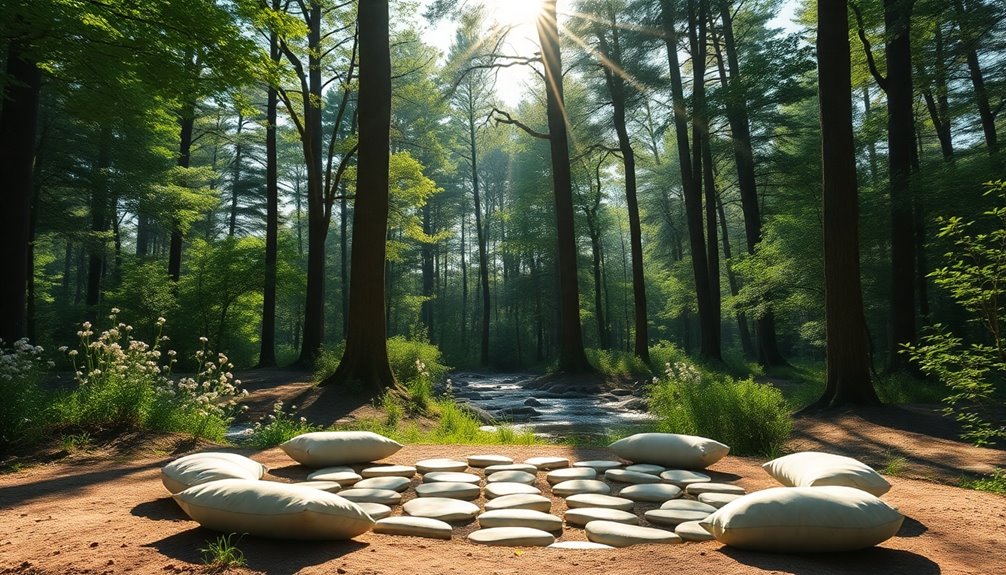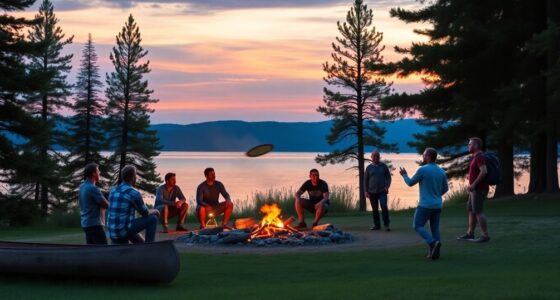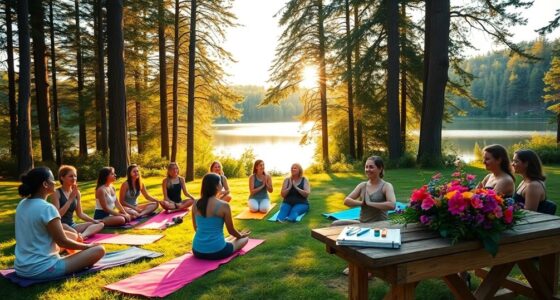When you're designing a spiritual retreat, focus on ten key considerations to create a meaningful experience. Start with a clear theme and purpose that resonates with participants. Choose a location that inspires—natural settings often enhance spiritual connections. Plan a mix of activities that balance group engagement with individual reflection time. Stay organized by defining objectives and involving attendees in theme selection. Pay attention to logistics, like travel arrangements and dietary needs, to facilitate a smooth journey. These elements cultivate deeper connections and profound growth. If you're curious about specific tips to enhance each aspect, there's more to explore.
Key Takeaways
- Select a meaningful theme that resonates with participants to enhance engagement and connection throughout the retreat.
- Choose a serene and culturally significant location that fosters reflection and deepens spiritual experiences.
- Incorporate a variety of activities, balancing collective experiences with individual reflection time for personal growth.
- Clearly define the retreat's objectives and engage attendees in theme selection to align expectations and intentions.
- Plan logistics carefully, including travel arrangements, dietary needs, and appropriate accommodation options for all participants.
Retreat Theme and Purpose
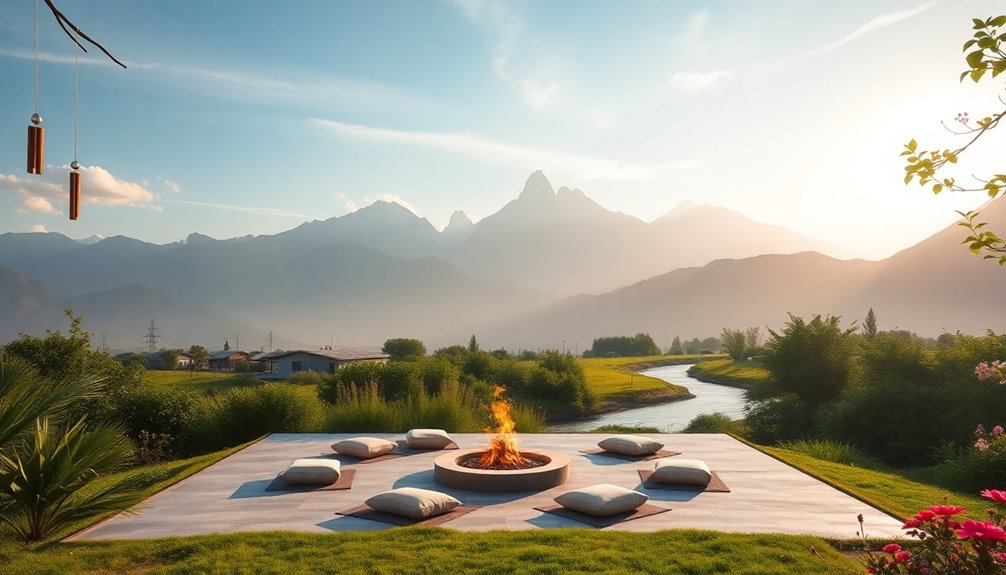
When planning a spiritual retreat, the theme and purpose are essential, as they set the tone for the entire experience. You can reveal your theme through prayer, discussions, or inspiration from books.
Consider themes like "Faith in Action" or "Unity in Community" to spark interest and foster growth. Customize the theme to fit your group's needs—this makes the retreat more meaningful. Tailored themes can enhance engagement and connection among attendees, ensuring everyone feels invested in the experience.
Involve your core team in brainstorming and aligning activities with the theme, such as workshops and devotionals. Use Bible verses or worship songs to enhance the experience.
Location and Accommodation
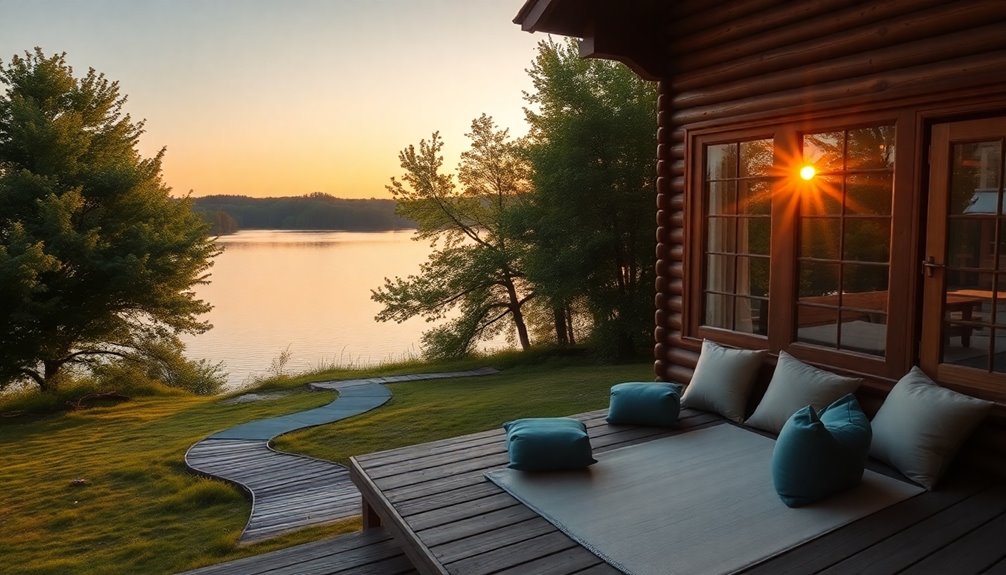
Choosing the right location and accommodation is essential for your spiritual retreat's success. A well-chosen environment enhances your experience and fosters deeper connections.
Here are key considerations to keep in mind:
- Natural Environment: Opt for places surrounded by nature, like forests or mountains, to amplify your spiritual journey.
- Cultural Significance: Seek locations rich in spiritual history, enhancing the depth of your retreat. Spiritual wellness retreats often benefit from environments that resonate with participants' goals.
- Accessibility and Seclusion: Balance seclusion with ease of access, ensuring logistical feasibility while maintaining tranquility.
- Accommodation Options: Provide varied accommodations, from private rooms to camping, catering to individual preferences.
Activities and Scheduling
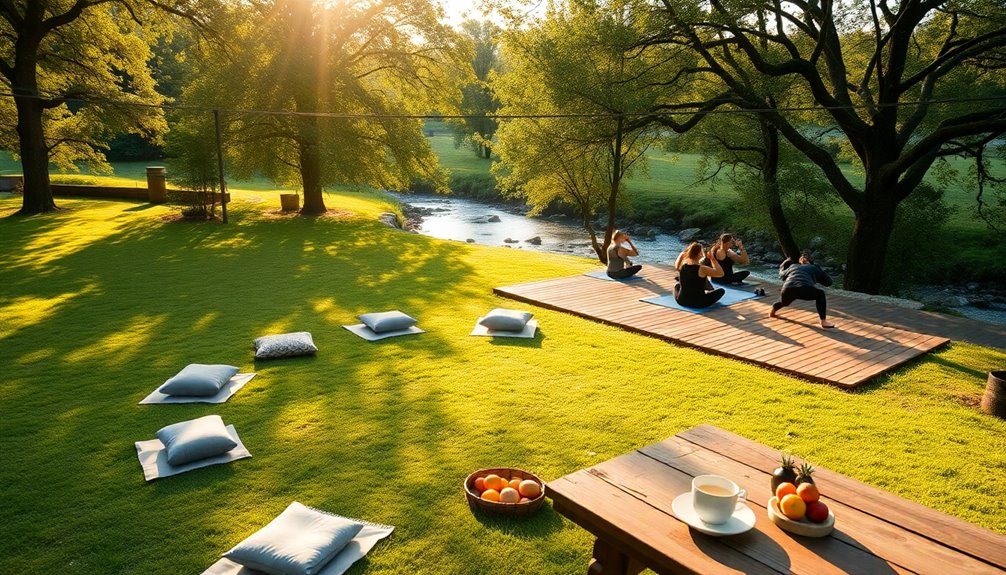
After securing the right location and accommodation, it's time to focus on the activities and scheduling that will shape the retreat experience.
Start by incorporating a variety of inclusive practices, such as meditation, journaling, and hiking, to cater to diverse needs. Balance collective activities with individual time for reflection. Additionally, consider the type of retreat you are organizing, as different activities can better serve specific themes, such as contemplative or team-building retreats.
Schedule activities according to natural rhythms, allowing quiet moments in the morning and evening. Don't forget to include free time for rest and spontaneous connections.
Guarantee your program features guided sessions and teachings aligned with the retreat's theme.
Finally, assess participants' needs to select activities that restore body, mind, and spirit, allowing for personal exploration and relaxation throughout the retreat.
Planning and Organization

Effective planning and organization are essential for creating a transformative spiritual retreat that resonates with participants.
To achieve this, consider these key elements:
- Choose a Theme: Pick a broad theme that speaks to participants, like "love" or "change."
- Define the Objective: Clearly outline the retreat's purpose to align everyone's expectations.
- Involve Participants: Engage potential attendees in the theme selection to guarantee it meets their needs.
- Select the Right Location: Find a serene space away from distractions, fostering a conducive atmosphere for reflection. Locations should be chosen thoughtfully, as they play a crucial role in enhancing the overall spiritual experience. Emotional support can significantly contribute to the effectiveness of the retreat.
Logistics and Preparation
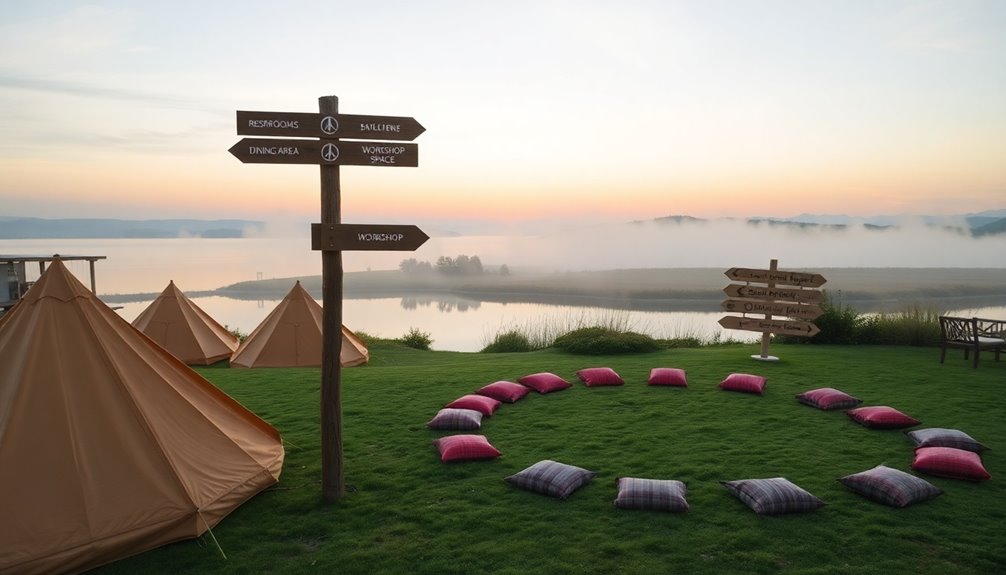
Once you've established a solid foundation through planning and organization, logistics and preparation come into play to guarantee a seamless experience for all participants.
First, choose your location wisely—consider the benefits of hosting abroad versus closer to home. Look into dedicated retreat centers for their convenience in managing transportation and dietary needs. As you select a venue, ensure it aligns with your retreat vision to create a meaningful impact. Many retreat locations also offer unique historical significance that can enrich the overall experience.
Coordinate travel arrangements, ensuring smooth transfers and accessibility for everyone. Gather dietary restrictions during the booking process to cater to all preferences, and clearly label food to prevent cross-contamination.
Encourage participants to set intentions and practice mindfulness before the retreat.
Finally, remind them to pack comfortable clothing and essential spiritual tools to enhance their experience.
Effective logistics make all the difference in creating a transformative retreat.
Frequently Asked Questions
What Should I Pack for a Spiritual Retreat?
When you're packing for a spiritual retreat, focus on essentials for comfort and relaxation.
Bring comfortable clothing, a journal, and personal hygiene items. Don't forget your favorite spiritual books or objects, like crystals.
If you're into meditation, a cushion can enhance your experience. Pack extra towels and bedding for a cozy stay.
Also, include a water bottle, sunscreen, and any medications you need. Organize everything to make your retreat stress-free.
How Can I Prepare Mentally for the Retreat?
To prepare mentally for your retreat, start by setting clear intentions. Reflect on what you want to achieve, whether it's peace or spiritual growth.
Embrace mindfulness and meditate regularly to quiet your mind. Stay open to new experiences and be flexible with your plans.
Reduce digital distractions to enhance focus, and prepare emotionally by acknowledging feelings that may arise.
Finally, let go of rigid expectations and be open to the surprises the retreat may bring.
Are There Age Restrictions for Attendees?
When you think of a retreat, don't imagine a stuffy old meeting room.
Instead, picture a vibrant gathering welcoming everyone, from newborns to seniors over 80!
There aren't any age restrictions for attendees, so you can bring your whole family.
Activities cater to all ages and mobility levels, ensuring everyone has a fulfilling experience.
Relax and enjoy the inclusive environment, knowing that you're part of a diverse community.
What if I Have Dietary Restrictions?
If you have dietary restrictions, it's crucial to communicate them ahead of time.
Most retreats are willing to accommodate various needs, whether you're vegan, gluten-free, or have allergies.
They'll likely plan meals that align with your requirements, ensuring you stay nourished without discomfort.
Don't hesitate to ask about specific foods that might be served, so you can enjoy your experience without worrying about what you'll eat.
Your well-being should always come first!
How Can I Stay Connected With Fellow Attendees After the Retreat?
To stay connected with fellow attendees after the retreat, consider joining a digital community on platforms like WhatsApp or Discord.
Create groups based on shared interests to foster meaningful discussions. Schedule regular check-ins and host Q&A sessions to keep everyone engaged.
Encourage sharing personal stories and reflections, and organize events like webinars or virtual meetups.
This way, you'll maintain those valuable connections and continue your journey of personal growth together.
Conclusion
In creating your spiritual retreat, remember it's like planting a seed; with careful consideration of theme, location, activities, and logistics, you'll nurture growth within yourself and others. Each element intertwines, forming a tapestry that supports transformation. When you harmonize these aspects, you cultivate an environment ripe for reflection and connection. So take the time to plan thoughtfully, and watch as the fruits of your labor blossom into profound experiences for all who attend.
